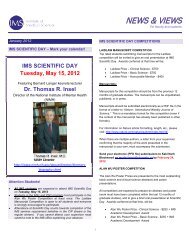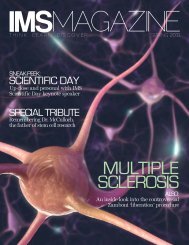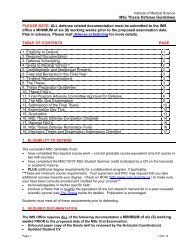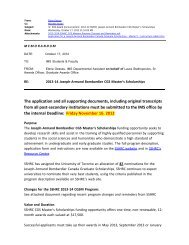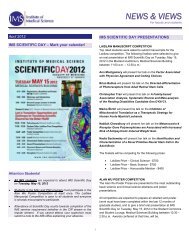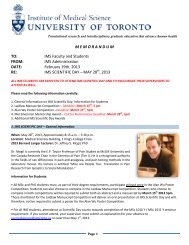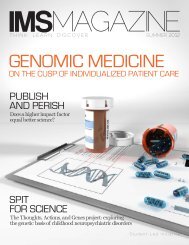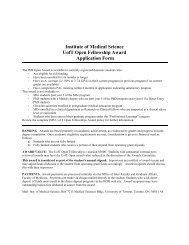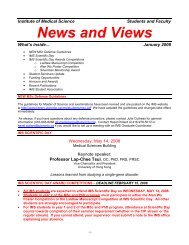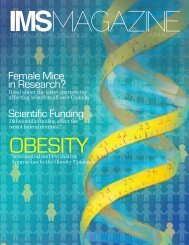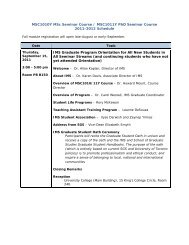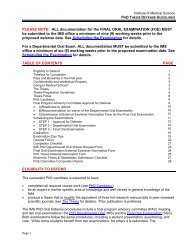Fall 2011 - Institute of Medical Science - University of Toronto
Fall 2011 - Institute of Medical Science - University of Toronto
Fall 2011 - Institute of Medical Science - University of Toronto
You also want an ePaper? Increase the reach of your titles
YUMPU automatically turns print PDFs into web optimized ePapers that Google loves.
FEATURE<br />
analysis suggested a small increase in highgrade<br />
cancer in the dutasteride arm. One patient<br />
(0.04%) was found to have Gleason 8-10<br />
cancer in the placebo arm compared to 12<br />
patients (0.5%) in the dutasteride arm. While<br />
there is evidence that this increase in grade<br />
was an artifact, it has led to concern about<br />
the widespread implementation <strong>of</strong> 5ARIs for<br />
prevention in healthy men. These patients<br />
also more commonly experienced sexual side<br />
effects. These studies provide further impetus<br />
for developing safe preventive agents that<br />
have more acceptable side-effect pr<strong>of</strong>iles and<br />
avoid the increased grade phenomenon.<br />
The mechanism by which high-fat diets contribute<br />
to cancer progression is thought likely<br />
to be related to increased insulin and/or related<br />
growth factor levels. Low-carbohydrate<br />
diets are based on maintaining low insulin<br />
levels. Our hypothesis is that a low-insulinemic<br />
diet, by virtue <strong>of</strong> reducing circulating<br />
insulin and IGF levels, may protect against<br />
the carcinogenic effect associated with highfat<br />
intake.<br />
In our laboratory, we have studied the influence<br />
<strong>of</strong> vitamin E, selenium, lycopene, flavonoids,<br />
and dietary intervention with a low<br />
carbohydrate diet on the growth, progression,<br />
and gene expression <strong>of</strong> a transgenic prostate<br />
cancer model (Lady TRAMP). This work was<br />
carried out by Dr. Vasu Venkateswaran and<br />
a number <strong>of</strong> fellows and graduate students.<br />
Our results are summarized as follows 5-11 :<br />
Experimental Results<br />
We have also evaluated the relationship between<br />
diet, exercise, and prostate cancer<br />
progression in a xenograft model. This study,<br />
carried out by our IMS graduate students,<br />
compared cancer progression in mice exercised<br />
on a treadmill for several hours per<br />
day, maintained on either a standard, or high<br />
fat-high carbohydrate diet. This study found,<br />
perhaps not surprisingly, that regular exercise<br />
in conjunction with a normal diet inhibited<br />
cancer growth. However, the group with<br />
the most rapid cancer progression was the<br />
exercising mice on a high fat-high carbohydrate<br />
diet. These animals had a higher energy<br />
intake than the non-exercising animals. Our<br />
hypothesis is that the exercise stimulated an<br />
increase in dietary intake <strong>of</strong> a ‘bad’ diet, resulting<br />
in increased cancer cell proliferation.<br />
We believe this process is mediated through<br />
the insulin-IGF1 axis as well as other pathways.<br />
This is something to consider the next<br />
time you eat a Big Mac after a workout!<br />
The relationship between dietary intake<br />
and prostate cancer incidence and mortality<br />
is complex. Extensive epidemiologic data<br />
points to a strong positive relationship between<br />
fat intake and prostate cancer progression;<br />
while a diet rich in fruits and vegetables<br />
(particularly lycopene containing plants like<br />
tomatoes) as well as soy products are suggested<br />
to have protective effects. The Japanese<br />
have shifted to a more Western diet over the<br />
last 20 years, and this has been accompanied<br />
by a rapid increase in prostate cancer incidence<br />
and mortality, which is now approaching<br />
North American rates. Specifically, with<br />
approximately one half the population <strong>of</strong> the<br />
US, the number <strong>of</strong> cases has increased over<br />
the last 20 years from 10% to 65% <strong>of</strong> the US<br />
incidence. Of course, separating the impact<br />
Vitamin E, selenium, and lycopene dramatically inhibit the development <strong>of</strong> prostate cancer in this model.<br />
Lycopene is a necessary component <strong>of</strong> this effect.<br />
Several flavonoids dramatically inhibit the growth <strong>of</strong> prostate cancer in a xenograft model. This is mediated<br />
through a number <strong>of</strong> cell cycle specific genes and pathways.<br />
A low carbohydrate diet reduces the growth rate <strong>of</strong> prostate cancer xenografts in mice on a high-fat diet<br />
compared to an isocaloric high-carbohydrate diet. This is mediated through the IGF family <strong>of</strong> mitogens.<br />
<strong>of</strong> increased case detection by PSA screening<br />
on these figures is challenging. Nonetheless,<br />
the overwhelming weight <strong>of</strong> evidence suggests<br />
that a diet more oriented towards plants<br />
and away from animal fat is prostate healthy.<br />
This dietary shift also results in lower cholesterol<br />
and triglycerides, leading to improved<br />
cardiovascular health, which shows that a<br />
prostate-healthy diet is really a diet healthy<br />
for the whole body.<br />
References<br />
1. Sakr WA, Grignon DJ, Crissman JD, Heilbrun LK,<br />
Cassin BJ, Pontes JJ, Haas GP. High grade prostatic intraepithelial<br />
neoplasia (HGPIN) and prostatic adenocarcinoma<br />
between the ages <strong>of</strong> 20-69: an autopsy study <strong>of</strong><br />
249 cases. In Vivo. 1994 May-Jun;8(3):439-43.<br />
2. Lippman SM, Klein EA, Goodman PJ, Lucia MS,<br />
Thompson IM, Ford LG, Parnes HL, Minasian LM, et<br />
al. Effect <strong>of</strong> selenium and vitamin E on risk <strong>of</strong> prostate<br />
cancer and other cancers: the Selenium and Vitamin E<br />
Cancer Prevention Trial (SELECT). JAMA. 2009 Jan<br />
7;301(1):39-51.<br />
3. Thompson IM, Goodman PJ, Tangen CM, Lucia MS,<br />
Miller GJ, Ford LG, Lieber MM, Cespedes RD, Atkins<br />
JN, Lippman SM, Carlin SM, Ryan A, Szczepanek CM,<br />
Crowley JJ, Coltman CA Jr. The influence <strong>of</strong> finasteride<br />
on the development <strong>of</strong> prostate cancer. N Engl J Med.<br />
2003 Jul 17;349(3):215-24.<br />
4. Andriole GL, Bostwick DG, Brawley OW, Gomella<br />
LG, Marberger M, Montorsi F, Pettaway CA, Tammela<br />
TL, Teloken C, Tindall DJ, Somerville MC, Wilson TH,<br />
Fowler IL, Rittmaster RS; REDUCE Study Group. Effect<br />
<strong>of</strong> dutasteride on the risk <strong>of</strong> prostate cancer. Engl J Med.<br />
2010 Apr 1;362(13):1192-202.<br />
5. Haddad AQ, Venkateswaran V, Viswanathan L, Teahan<br />
SJ, Fleshner NE, Klotz LH. Novel antiproliferative flavonoids<br />
induce cell cycle arrest in human prostate cancer<br />
cell lines. Prostate Cancer Prostatic Dis. 2006;9(1):68-76.<br />
6. Venkateswaran V, Fleshner NE, Sugar LM, Klotz LH.<br />
Antioxidants block prostate cancer in lady transgenic<br />
mice. Cancer Res. 2004 Aug 15;64(16):5891-6.<br />
7. Venkateswaran V, Klotz LH. Diet and prostate cancer:<br />
mechanisms <strong>of</strong> action and implications for chemoprevention.<br />
Nat Rev Urol. 2010 Aug;7(8):442-53. Epub 2010<br />
Jul 20. Review.<br />
8. Haddad AQ, Fleshner N, Nelson C, Saour B, Musquera<br />
M, Venkateswaran V, Klotz L. Antiproliferative<br />
mechanisms <strong>of</strong> the flavonoids 2,2’-dihydroxychalcone<br />
and fisetin in human prostate cancer cells. Nutr Cancer.<br />
2010;62(5):668-81.<br />
9. Hou M, Venier N, Sugar L, Musquera M, Pollak M,<br />
Kiss A, Fleshner N, Klotz L, Venkateswaran V. Protective<br />
effect <strong>of</strong> metformin in CD1 mice placed on a high<br />
carbohydrate-high fat diet. Biochem Biophys Res Commun.<br />
2010 Jul 2;397(3):537-42. Epub 2010 Jun 2.<br />
10. Cervi D, Pak B, Venier NA, Sugar LM, Nam RK,<br />
Fleshner NE, Klotz LH, Venkateswaran V. Micronutrients<br />
attenuate progression <strong>of</strong> prostate cancer by elevating<br />
the endogenous inhibitor <strong>of</strong> angiogenesis, platelet<br />
factor-4..BMC Cancer. 2010 Jun 4;10:258.<br />
11. Venkateswaran V, Klotz LH, Ramani M, Sugar<br />
LM, Jacob LE, Nam RK, Fleshner NE. A combination<br />
<strong>of</strong> micronutrients is beneficial in reducing the incidence<br />
<strong>of</strong> prostate cancer and increasing survival in the<br />
Lady transgenic model. Cancer Prev Res (Phila). 2009<br />
May;2(5):473-83.<br />
IMS MAGAZINE FALL <strong>2011</strong> PROSTATE CANCER | 16



